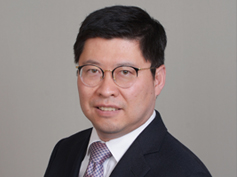NEWS & EVENTS
Q&A: The shaping of the modern-day energy market
NEWS
Dec 19, 2022
 Katherine Ensor, the Noah G. Harding Professor of Statistics and CoFES director interviews Wentao Zhao, who served as lecturer for the Rice University course Quantitative Financial Risk Management - STAT 449/649 during the fall 2022 semester. Zhao is also an adjunct faculty member of Rice’s Department of Statistics and an external advisory board member to CoFES.
Katherine Ensor, the Noah G. Harding Professor of Statistics and CoFES director interviews Wentao Zhao, who served as lecturer for the Rice University course Quantitative Financial Risk Management - STAT 449/649 during the fall 2022 semester. Zhao is also an adjunct faculty member of Rice’s Department of Statistics and an external advisory board member to CoFES. Introducing: Wentao Zhao, Ph.D., is a quantitative analytics manager in global gas optimization and trading at ExxonMobil. Zhao brings extensive experience working in various financial markets and in risk management, structuring and hedging, economic forecast, and related quantitative modeling. His instructional methods draw from 15 years of industry experience.
Introducing: Wentao Zhao, Ph.D., is a quantitative analytics manager in global gas optimization and trading at ExxonMobil. Zhao brings extensive experience working in various financial markets and in risk management, structuring and hedging, economic forecast, and related quantitative modeling. His instructional methods draw from 15 years of industry experience.
. . .
Dr. Zhao, on behalf of CoFES and the university I first and foremost thank you for contributing to the Quantitative Financial Risk Management course offerings this fall. You have provided our students with real-world insight into the applications of quantitative methods and computer programming to solve problems in finance, energy trading and strategy.Ensor: Energy trading operations have changed dramatically. The deregulation of the energy industry influenced significant change on energy trading floors and since 2000, energy trading environments have mirrored those of Wall Street. As a quantitative analytics manager in global gas optimization and trading for ExxonMobil and formerly the VP of quantitative research for PIMCO, what does the organization of tomorrow’s energy trading look like? What does this mean for Houston and the need to grow programs in academia?
Zhao: Thank you for the introduction. I think the energy trading floor will continue to provide risk management and logistic services so that the growing global demand for energy can be met with more diversified and renewable supply sources. At the same time, we will be facing challenges and opportunities from lower emission mandates, higher market volatility, different regulatory environment, and fast-evolving technology. The energy trading floor will be adaptive to our new missions, in terms of organizational structure, business model, digital infrastructure, and employee training.
As the energy capital of the world and the main hosting city of big companies, Houston is well-positioned to lead the energy transition in a sustainable and economic way. Local high education institutions, like Rice University, shoulder responsibilities to grow energy programs, with the aim that our next generation of talents can be prepared to embrace and contribute to the energy future, deliver rigorous and robust solutions and provide thought leadership to the society.
Ensor: With the rise of digital trading, big data, and financial technologies such as AI, machine learning, and blockchain, what changes do you see in energy trading?
Zhao: Data and information technology have been quickly adopted by the trading industry to improve market and operational efficiency. Big data, AI, and blockchain innovate the way that we conduct analytics and make decisions in running our business.
I would expect energy trading will be more transparent, decentralized, and cost-effective; also with new government regulations. There is no doubt that both energy consumers and producers would benefit through more efficient energy trading intermediary. For trading floors, we have already observed increasing investment in digital transformation, construction of new systems and new processes, and recruitment focusing on the areas related to data science and engineering.
Ensor: Traditionally energy companies have traded on commodities such as natural gas, crude oil, and coal. In today’s world of climate change, what is the potential for trading on green energy such as expanding solar, wind generation, even biofuels and nuclear power?
Zhao: There have been broad developments in both mandatory and voluntary markets for renewable energy credits and carbon offsets. Also, market participants are setting up trading teams to provide services in financing, structuring, and hedging of renewable projects. All business activities, both buy and sell side of trading and investment, have actively considered the carbon footprints and ESG in the decision-making process.
As a key link in the market-based approach, trading on renewables is growing in size and complexity in tandem with the green energy business.
Ensor: How have your experiences in teaching at Rice, influenced your perspectives in energy trading as a quantitative analytics manager in global gas optimization?
Zhao: It has been a fantastic semester for me to get to know our intelligent students. I appreciate the opportunity to share with the students my experiences in derivative markets and trading. The interactions with students and professors at Rice have inspired me to come up with empirical research topics for my team and have motivated me to implement more rigorous risk management for my company. It has been an invaluable journey to build both my teaching experience at Rice and bridge collaboration between the university and my company.